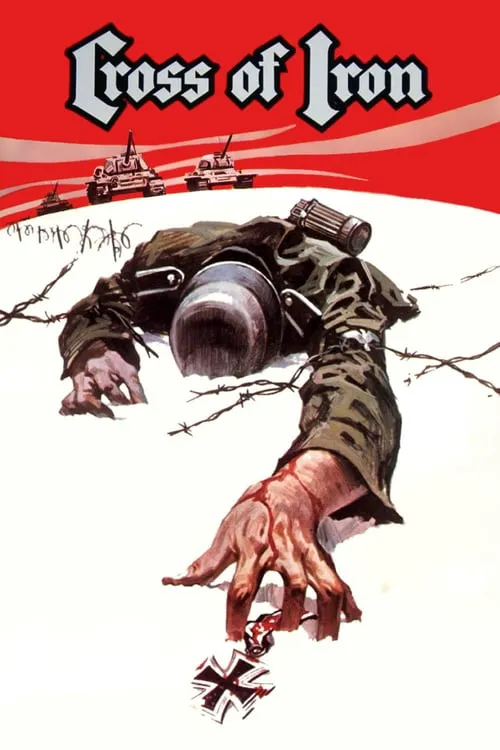Cross of Iron

Plot
Set against the backdrop of World War II, the film "Cross of Iron" is a gripping drama that delves into the psyche of two vastly different individuals - Captain Stransky and Corporal Steiner - as they navigate the chaos and brutality of the Russian front. Director Sam Peckinpah masterfully weaves a tale of moral ambiguity, conflict, and the human condition, raising poignant questions about loyalty, honor, and the true essence of heroism. As the German army frantically retreats from the Russian front in 1943, Captain Stransky, an aristocrat with an entitled attitude, stands resolute in his conviction that the Third Reich is still superior to its Soviet adversary. However, beneath his pompous exterior lies a quivering mass of cowardice, driven by a desperate desire to secure the prestigious Iron Cross, the ultimate symbol of military valor. For Stransky, the Cross represents a ticket back to Berlin, a chance to be celebrated as a hero amidst the ruins of a nation on the brink of collapse. On the other hand, Corporal Steiner - a rugged, no-nonsense soldier with a penchant for rebellion - embodies the values of duty, loyalty, and selflessness. Unfazed by the accolades and honors dangled before him by his superiors, Steiner's primary concern is the well-being and safety of his men, whom he regards as a family. He has no use for the trappings of glory and sees through Stransky's façade, recognizing the latter's crippling fear and emptiness. As both characters move through the war-torn landscape, their contrasting perspectives create a palpable tension, underscoring the deepening gulf between them. Stransky's fixation on the Iron Cross serves as a stark reminder of the societal pressure to conform, to adhere to traditional notions of heroism and sacrifice. Steiner, in contrast, represents a growing disillusionment with the wartime machinery, refusing to be complicit in the dehumanizing machine that churns out soldiers like cannon fodder. Their conflict escalates as Stransky's fixation on the Iron Cross becomes an increasing point of contention. He sees Steiner as an obstacle to his own advancement, a threat to his carefully constructed persona. Meanwhile, Steiner views Stransky as a symbol of everything that is wrong with the system - a system that encourages men like him to prioritize personal gain over their fellow soldiers' lives. As the battle rages on, the stakes are raised, and the contrast between Stransky and Steiner becomes more pronounced. Peckinpah uses this tension to highlight the futility and chaos that pervades the war, creating a sense of moral ambiguity that refuses to yield to simplistic narratives of good vs. evil. The film eschews romanticized portrayals of heroism, opting instead for a nuanced exploration of the human experience. The cinematography, courtesy of Jack Ward, captures the ravaged landscape, emphasizing the desolate, nightmarish quality of war. The score, composed by Jerry Goldsmith, adds to the somber atmosphere, its haunting melodies underscoring the futility and despair that pervade the narrative. Ultimately, "Cross of Iron" presents a searing critique of war and the societal expectations that come with it. As Stransky and Steiner's conflict reaches a boiling point, the film poses a profound question: what does it mean to be a hero in the midst of chaos and destruction? Peckinpah's answer is far from simplistic, instead opting for a complex and deeply human portrayal of two individuals, each navigating their own moral landscape in the face of unimaginable adversity. As the film hurtles towards its conclusion, one thing is certain: neither Stransky nor Steiner will emerge unscathed, their experiences forever changed by the horrors they have witnessed on the Russian front.
Reviews
Recommendations




